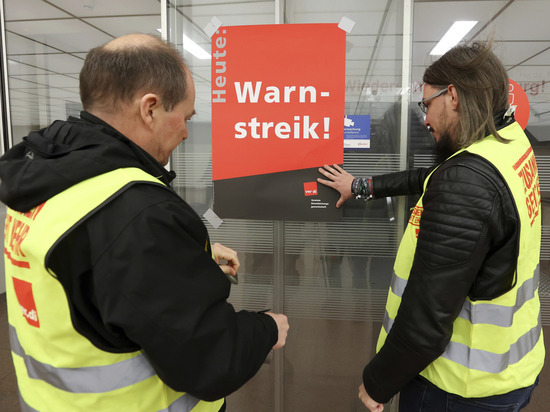The largest – in the past 30 years – strike paralyzed Germany on March 27. Traffic was restricted throughout the Federal Republic. Trade unions, on the one hand, have set themselves the task of increasing pressure on employers when concluding collective agreements, on the other hand, we are talking about raising wages.
This Monday, trains, buses and planes were largely at a standstill in Germany. The Railway and Transport Union (EVG) has called on some 230,000 workers from around 50 railway companies to go on strike. Long-distance traffic and most regional traffic have been completely suspended. Almost all German airports, waterways and ports, road companies are affected. In addition, public transport was on strike in seven federal states. As a result, millions of passengers and travelers are among the victims.
A major warning strike by the railway unions EVG and Verdi lasted 24 hours. Thus, the unions demand higher salaries for civil servants. And I must say that half of the country’s population adequately reacted to this action.
Should we expect problems at Easter?
Those who have booked or scheduled a train journey for Easter can rest easy: amid the ongoing pay dispute, the rail and transport union said it was not planning any warning strikes over the holidays .
“Because we want strikes not for the passengers, but for the employers, we can announce today that we will not be negotiating at Easter and therefore that we will not go on strike”, said Christian Loroch, member of the committee of Stag collective bargaining at Deutsche Presse-Agentur.
Can we expect similar strikes in the near future?
The day of the big joint strike is a long-planned, but initially ad hoc, trade union action. Thus, Verdi planned to increase the pressure on the municipalities and the federal government before the start of the third round of civil service negotiations. If a mutual agreement is reached in Potsdam, the railway union EVG will no longer be able to organize new railway strikes in solidarity with Verdi. But given the conflict situation, new strikes in the public sector are by no means excluded from the repertoire.
The negotiations have not yet been crowned with an agreement, however, before and during Easter, warning transport strikes are not planned. “Because we want to show our determination not to passengers, but to employers, we are declaring that we will not go on strike at Easter,” said Christian Loroch, a member of the EVG Collective Bargaining Council.
The Verdi union has not made such a clear statement on this. However, officials also clarified that before and during Easter, transportation would proceed as normal. “If the negotiations do not lead to the desired result, we can imagine new strikes,” said a spokeswoman for the union in Berlin. “Before Easter, however, there are no such plans.”
Based on the fact that employers are in no hurry to take quick action, German residents are still waiting for a mega-strike.


